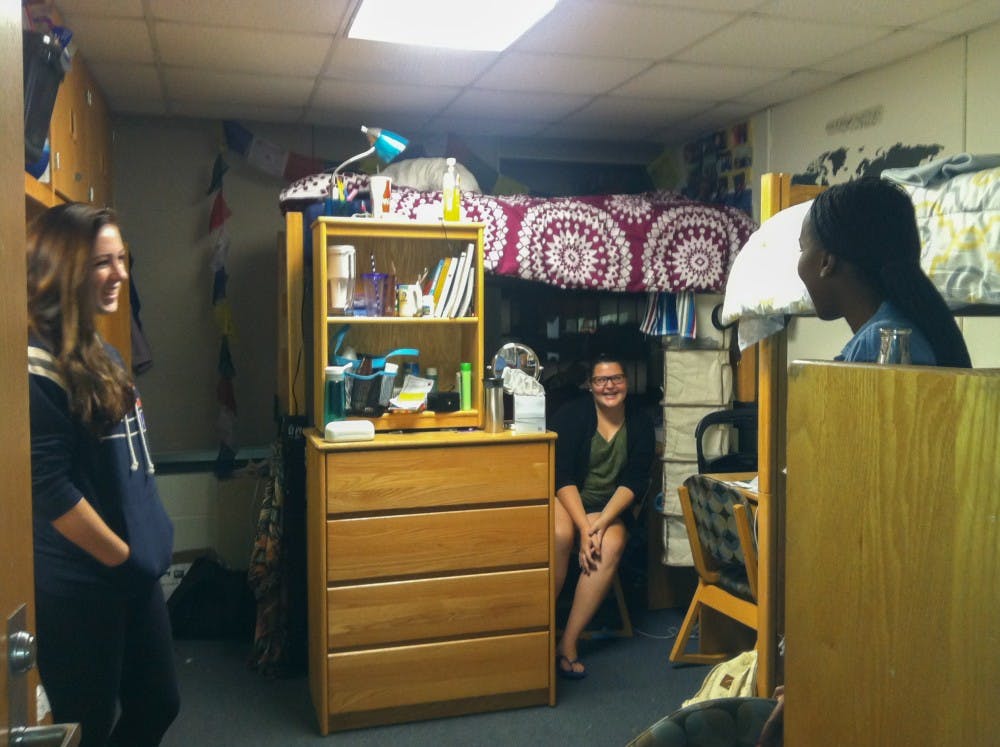The dorms are a tight squeeze for approximately 45 percent of first year students at AU this semester who are living in temporary triples as Housing and Dining tries to distribute rare vacated spots in Letts, Anderson, Hughes and Leonard Halls.
AU had the highest amount of students accept their admissions offer in the University’s history, according to a July 24 memo released by President Neil Kerwin. This demand for first year housing caused approximately a 17 percent increase in temporary triple rooms, which are dorm rooms typically assigned to two students that contain three occupants, during the 2014-2015 academic year.
“Most of our first year students take advantage of on-campus housing,” Sasha Gamburg, assistant director of operations: assignments and dining for Housing and Dining, said by email.
Housing and Dining estimates that 38 percent of first year students were living in temporary triples during the 2013-2014 academic year, Gamburg said by email.
The lack of available space in the residence halls is not just affecting first year students. Returning students who missed the March housing deadline are also living in non-traditional housing.
Forty-five students who missed the deadline were temporarily housed in a lounge at the beginning of the school year, Gamburg said by email. Housing and Dining found accommodations for 40 of these students, but five students are still living in the temporary lounge and have yet to be placed in permanent housing as of Sept. 17, Gamburg said by email. One student is scheduled to be assigned a room on Sept. 18, Gamburg said by email.
No first year students were living in the lounge, Gamburg said by email.
East Campus, which will include three residence halls and 590 beds, should help the University accommodate more students in the future, Gamburg said by email. The expansion is targeted to be completed during the summer of 2016, according to a University fact sheet.
Temporary triples are a game of give-and-take
Housing and Dining is working to de-triple first year students’ rooms, but the process is ongoing, Gamburg said by email.
A “few dozen” rooms have been de-tripled since Welcome Week, Gamburg said by email. When space in a double room becomes available it is offered to the individual with the earliest deposit date in an existing triple, Gamburg said by email.
But for three girls on the sixth floor of Anderson Hall, the de-tripling odds do not look good.
Jamie Bindon, a freshman in the School of International Studies who is currently living in that temporary triple, applied for on-campus housing near the end of the acceptance deposit deadline.
Bindon stated on her application that she prefered to live in a double room, but before school started she received an email saying that she had been waitlisted for all three University College programs she had applied for and placed in a temporary triple. It was not what she expecting, Bindon said.
“Then I had this moment where I realized: I’m getting to go to the school of my choice, live in D.C. – it just means I get to live with one extra person,” Bindon said.
Bindon’s roommates Carina Chao, a freshman in SIS, and Jenae Addison, a freshman in the School of Communication and School of Public Affairs, self-selected to live in triples when applying for housing due to the reduced cost.
Students assigned to a temporary triple are charged $3,585 per semester for housing, which is about $1,200 less than the price that students living in the same rooms with just one roommate are charged, according to amounts provided by Gamburg in an email.
Chao and Addison said that living in a triple was an opportunity for them to get to know more people.
“I can bond with both of them and have even more experiences,” Addison said.
Space is limited but the living arrangements appear to be working well for the girls almost four weeks into the semester, Chao said. A complex system of give-and-take has been put in place; Bindon gets the lower bunk but half a closet with Chao and shares a vanity with Addison, who gets her own closet.
“Living space wise is a bit cramped, but we’re just in there to sleep,” Chao said.
The girls expressed a common inability to do homework in the room, because of how tight the furniture is arranged and the lack of natural light due to a lofted bed in front of the windows. Instead, they have already found themselves studying throughout the campus, heading to the library, relaxing with floormates in the lounge and completing homework in study rooms.
“You’re going to suffer if you don’t cooperate,” Bindon said. “If you communicate it can be great.”





